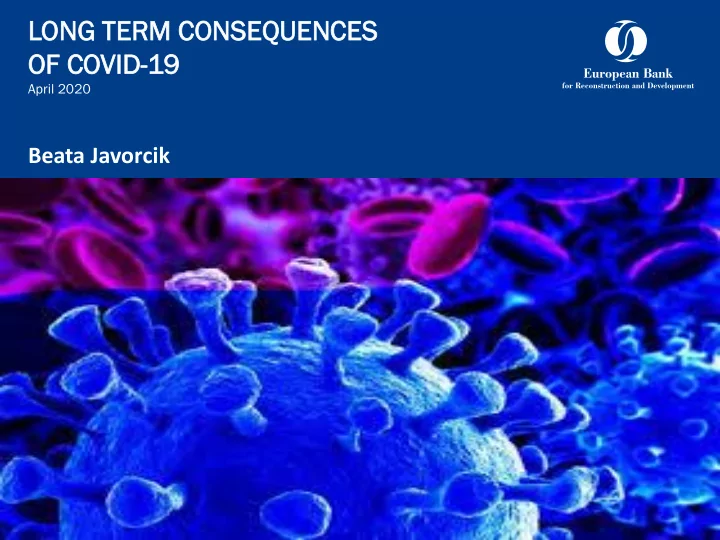

LONG G TERM CONSEQUEN EQUENCES CES OF CO F COVID-19 19 April 2020 Beata Javorcik
Remote working is here to stay • Less demand for office space => impact on real estate market • In some occupations, more monitoring via software • Epidemics of loneliness? US Health Resources & Services Administration
Remote working is here to stay • Density of ideas in a physical location becomes less important • Home office => demand for more space at home • Boost to secondary cities
Boost to secondary cities Change in GDP share and population share of the GDP per capita in the largest city’s metropolitan region, largest city’s metropolitan area, 2000 -2017 2017 (Percentage points) (Nation ional l avera erage= ge=100 00) • Sources: Liveable Cities Report (2019). Eurostat and authors’ calculations. • Notes: 2016 data for Ireland, France, Croatia, Italy, Latvia, Lithuania, Sources: Liveable Cities Report (2019). Eurostat and authors’ the Netherlands, Norway, North Macedonia and Albania. calculations.
Boost to secondary cities Implications for • Spatial inequality • Politics (spatial inequality less of a source of discontent?) • Low carbon transition?
GLOBALIZATION
Rethinking of global value chains This time is different Changes to GVCs • More focus on resilience • COVID exposes excessive • Building in redundancy concentration of suppliers • Move away from zero- inventory approach • Uncertainty about trade policy • Greater weight given to – US-China trade war resilience by credit rating – Weakened WTO agencies • Both types of shocks likely • Opportunities for lesser known to come back investment destinations
Will globalization be rolled back? • Contrary to popular fears, it did not happen during the financial crisis
Limited scope for tariff hikes under the WTO and Preferential Trade Agreements rules Source: Foletti et al. (2009) MFN tariff = tariff actually applied Bound tariff = maximum tariff allowed under the WTO commitments Tariff water = bound tariff – MFN tariff Smoke in the water = meaningless policy space (applied tariff is already prohibitive or most trade occurs under preferential trade agreements subject to different rules) Meaningful water = economically meaningful policy space
Will globalization be rolled back? • • Will the EU provide Weakened WTO strong leadership? • Not functioning Dispute Resolution System • Export restrictions even within the EU • Security concerns could be used to justify protectionism • US paved way to using National Security Exceptions (Article XXI)
CLIMATE CHANGE
Climate Change Mitigation Threats • Risk that the COVID-19 crisis Oil price drop to levels last seen in 1999 (in inflation-adjusted terms) on weak outlook will eclipse the climate action , which is desperately and urgently needed • With oil and gas prices likely to be suppressed for a while, the COVID crisis risks to cause a dangerous ‘pause’ in the drive to green
Climate Change Mitigation Reason ons for not ot adoptin ting g Opportunities energy rgy efficiency ency measur sures es vary • Remote work & less business travel => less emissions • Signal strong commitment to green => impact on new GVCs • Climate change likely to lead to new disease outbreaks => more public support for action • Source: Transition Report 2019 Tilting to Green
Tilting to Green • An immense amount of money is being spent to counteract the COVID-19 crisis. Latest estimates are 3% of global GDP , likely to be higher • This creates an opportunity to ‘tilt to green’ the government’s funds currently dedicated to COVID-19 and turn this stimulus into the key accelerator to a low-carbon economy
THE STATE STRIKES BACK
The State strikes back • The COVID crisis exposed weaknesses of gig economy & zero hour contracts => rethinking of the labour market rules • Shift from ESG to regulation? • More expected of the state • Nationalizations
Populism & Democracy • Mixing of anti-crisis response with politics • Open power grab justified by the outbreak • Erosion of privacy protections • Stimulus creates opportunities for corruption
Populism & Democracy • Will the outbreak expose incompetence of some populist leaders ? • Or will propaganda manage to counteract that? • Will trust in experts be restored? • Will COVID lead to more international cooperation?
Recommend
More recommend